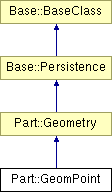Part::GeomPoint Class Reference
#include <Geometry.h>

Public Member Functions | |
| virtual Geometry * | clone (void) const |
| returns a cloned object | |
| GeomPoint (const Base::Vector3d &) | |
| GeomPoint (const Handle_Geom_CartesianPoint &) | |
| GeomPoint () | |
| virtual unsigned int | getMemSize (void) const |
| This method is used to get the size of objects It is not meant to have the exact size, it is more or less an estimation which runs fast! Is it two bytes or a GB? | |
| Base::Vector3d | getPoint (void) const |
| virtual PyObject * | getPyObject (void) |
| This method returns the Python wrapper for a C++ object. | |
| virtual Base::Type | getTypeId (void) const |
| const Handle_Geom_Geometry & | handle () const |
| virtual void | Restore (Base::XMLReader &) |
| This method is used to restore properties from an XML document. | |
| virtual void | Save (Base::Writer &) const |
| This method is used to save properties to an XML document. | |
| void | setPoint (const Base::Vector3d &) |
| virtual TopoDS_Shape | toShape () const |
| virtual | ~GeomPoint () |
Static Public Member Functions | |
| static void * | create (void) |
| static Base::Type | getClassTypeId (void) |
| static void | init (void) |
Detailed Description
Definition at line 82 of file Geometry.h.
Constructor & Destructor Documentation
| GeomPoint::GeomPoint | ( | ) |
Definition at line 192 of file Geometry.cpp.
Referenced by clone().
| GeomPoint::GeomPoint | ( | const Handle_Geom_CartesianPoint & | p | ) |
Definition at line 197 of file Geometry.cpp.
| GeomPoint::GeomPoint | ( | const Base::Vector3d & | p | ) |
Definition at line 202 of file Geometry.cpp.
References Base::Vector3< _Precision >::x, Base::Vector3< _Precision >::y, and Base::Vector3< _Precision >::z.
| GeomPoint::~GeomPoint | ( | ) | [virtual] |
Definition at line 207 of file Geometry.cpp.
Member Function Documentation
| Geometry * GeomPoint::clone | ( | void | ) | const [virtual] |
returns a cloned object
Implements Part::Geometry.
Definition at line 216 of file Geometry.cpp.
References Part::Geometry::Construction, and GeomPoint().
| void * Part::GeomPoint::create | ( | void | ) | [static] |
Reimplemented from Part::Geometry.
Definition at line 190 of file Geometry.cpp.
| Base::Type Part::GeomPoint::getClassTypeId | ( | void | ) | [static] |
Reimplemented from Part::Geometry.
Definition at line 190 of file Geometry.cpp.
| unsigned int GeomPoint::getMemSize | ( | void | ) | const [virtual] |
This method is used to get the size of objects It is not meant to have the exact size, it is more or less an estimation which runs fast! Is it two bytes or a GB?
Reimplemented from Part::Geometry.
Definition at line 239 of file Geometry.cpp.
| Base::Vector3d GeomPoint::getPoint | ( | void | ) | const |
Definition at line 228 of file Geometry.cpp.
Referenced by getPyObject(), and Save().
| PyObject * GeomPoint::getPyObject | ( | void | ) | [virtual] |
This method returns the Python wrapper for a C++ object.
It's in the responsibility of the programmer to do the correct reference counting. Basically there are two ways how to implement that: Either always return a new Python object then reference counting is not a matter or return always the same Python object then the reference counter must be incremented by one. However, it's absolutely forbidden to return always the same Python object without incrementing the reference counter.
The default implementation returns 'None'.
Reimplemented from Base::BaseClass.
Definition at line 276 of file Geometry.cpp.
References getPoint().
| Base::Type Part::GeomPoint::getTypeId | ( | void | ) | const [virtual] |
Reimplemented from Part::Geometry.
Definition at line 190 of file Geometry.cpp.
| const Handle_Geom_Geometry & GeomPoint::handle | ( | ) | const [virtual] |
Implements Part::Geometry.
Definition at line 211 of file Geometry.cpp.
| void Part::GeomPoint::init | ( | void | ) | [static] |
Reimplemented from Part::Geometry.
Definition at line 190 of file Geometry.cpp.
Referenced by initPart().
| void GeomPoint::Restore | ( | Base::XMLReader & | ) | [virtual] |
This method is used to restore properties from an XML document.
It uses the XMLReader class, which bases on SAX, to read the in Save() written information. Again the Vector as an example:
void PropertyVector::Restore(Base::XMLReader &reader) { // read my Element reader.readElement("PropertyVector"); // get the value of my Attribute _cVec.x = (float)reader.getAttributeAsFloat("valueX"); _cVec.y = (float)reader.getAttributeAsFloat("valueY"); _cVec.z = (float)reader.getAttributeAsFloat("valueZ"); }
Reimplemented from Part::Geometry.
Definition at line 259 of file Geometry.cpp.
References Base::XMLReader::getAttributeAsFloat(), Base::XMLReader::readElement(), and setPoint().
| void GeomPoint::Save | ( | Base::Writer & | ) | const [virtual] |
This method is used to save properties to an XML document.
A good example you'll find in PropertyStandard.cpp, e.g. the vector:
void PropertyVector::Save (Writer &writer) const { writer << writer.ind() << "<PropertyVector valueX=\"" << _cVec.x << "\" valueY=\"" << _cVec.y << "\" valueZ=\"" << _cVec.z <<"\"/>" << endl; }
The writer.ind() expression writes the indention, just for pretty printing of the XML. As you see, the writing of the XML document is not done with a DOM implementation because of performance reasons. Therefore the programmer has to take care that a valid XML document is written. This means closing tags and writing UTF-8.
- See also:
- Base::Writer
Reimplemented from Part::Geometry.
Definition at line 244 of file Geometry.cpp.
References getPoint(), Base::Writer::ind(), Base::Writer::Stream(), Base::Vector3< _Precision >::x, Base::Vector3< _Precision >::y, and Base::Vector3< _Precision >::z.
| void GeomPoint::setPoint | ( | const Base::Vector3d & | p | ) |
Definition at line 233 of file Geometry.cpp.
References Base::Vector3< _Precision >::x, Base::Vector3< _Precision >::y, and Base::Vector3< _Precision >::z.
Referenced by Restore().
| TopoDS_Shape GeomPoint::toShape | ( | ) | const [virtual] |
Implements Part::Geometry.
Definition at line 223 of file Geometry.cpp.
The documentation for this class was generated from the following files:
 1.6.1
1.6.1